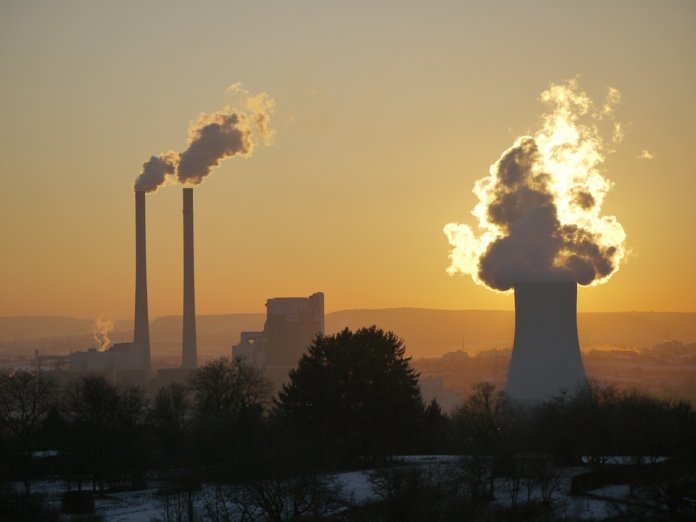The Trump administration reportedly has plans in the works to direct U.S. grid operators to purchase power from struggling coal and nuclear facilities – a move immediately condemned by several energy industry associations and clean energy groups.
According to a report from Bloomberg, at a meeting today of the White House National Security Council, a 41-page draft memo was circulated that outlines the need for the U.S. grid to be “resilient and secure.”
“The nation’s security and defensive capabilities, as well as critical infrastructure, depend on an electric grid that can withstand and recover from a major disruption, whether from an adversarial attack or a natural disaster,” the memo states. “That ability to recover, known as the grid’s resilience, in turn depends on the availability of robust and secure electric generation resources and their supportive supply chains.
“In particular, resources that have a secure on-site fuel supply, including nuclear and coal-fired power plants, as well as oil-fired and dual-fuel units with adequate storage, are essential to support the nation’s defense facilities, critical energy infrastructure, and other critical infrastructure.”
It says even though “intermittent resources,” such as wind and solar power, do “provide value at various times during the day,” it is “during times of peak demand when there is the greatest strain on the electricity grid” that “many major electricity markets are and will continue to be heavily dependent on fossil and nuclear electric generation resources.” Similarly, last year, Rick Perry, secretary of the U.S. Department of Energy (DOE), formally proposed that the Federal Energy Regulatory Commission take “swift action to address threats to U.S. electrical grid resiliency” – a move that was opposed by many clean energy groups that claimed the request favored coal and nuclear generation.
According to an analysis from the Sierra Club, the draft plan would exploit Section 202(c) of the Federal Power Act and the Cold War-era Defense Production Act (DPA) to force American families and businesses to bail out uneconomic coal and nuclear plants. The group calls the DPA an “obscure wartime law that allows the president to secure scarce resources for national defense.” Under the Federal Power Act, Section 202(c) allows the DOE secretary to issue an “emergency run order” for use in only the most extreme circumstances, such as an act of war or severe grid impairment.
“However, since grid operators, industry experts and utilities have repeatedly and forcefully stated that there is no energy shortage and there is no evidence of an emergency, Trump’s scheme today is not just unnecessary – it is likely illegal,” the Sierra Club claims.
On the other hand, U.S. Sen. Joe Manchin, D-Va., says in a statement he is “encouraged” that the DOE is considering enacting the DPA. The lawmaker, as a member of the Senate Energy and Natural Resources Committee, says he first encouraged Trump, Perry and U.S. Secretary of Defense James Mattis to examine the DPA in April.
“I am glad President Trump and his administration are considering my idea to use the Defense Production Act to save coal-fired power plants with emissions controls and protect our national security,” Manchin says. “The security of our homeland is inextricably tied to the security of our energy supply. The ability to produce reliable electricity and to recover from disruptions to our grid are critical to ensuring our nation’s security against the various threats facing our nation today – whether those threats be extreme weather events or adversarial foreign actors. The Defense Production Act grants the president the authority to ensure that the nation’s domestic industrial base is capable of providing the essential materials and resources needed to defend our nation and protect our sovereignty, and it recognizes energy production and critical infrastructure as strategic and crucial to that goal.”
In contrast, in response to the draft memo, on behalf of the American Wind Energy Association, Amy Farrell, the group’s senior vice president for government and public affairs, states, “Independent energy regulators, grid operators and other experts have gone on the record to declare that orderly power plant retirements do not constitute an emergency for our electric grid. Infrastructure and processes are already in place to ensure that remains the case. The reported proposal would be a misapplication of emergency powers; there’s certainly no credible justification to force American taxpayers to bail out uneconomic power plants.”
Likewise, on behalf of the Solar Energy Industries Association, Christopher Mansour, the group’s vice president for federal affairs, says, “A policy to spend billions of dollars keeping uneconomic power plants afloat – while trying to put clean and affordable solar on the sidelines – is not a recipe for economic success. Energy experts across a range of industries, within the federal government and in academia have agreed that this sort of effort will create a bloated power sector deploying outmoded technologies. We urge policymakers to again block this ill-advised effort to keep plants running that most electric utilities have already decided to abandon – and for good reason.”
Calling the draft plan “unwarranted” and “ill-conceived,” Tom Foley, senior vice president of policy and government affairs for the American Council on Renewable Energy, warns that “arbitrary market interventions deprive businesses of the certainty they need to invest in power plants of all types, harming not helping electric reliability.”
On the energy storage side, similarly, Kelly Speakes-Backman, CEO of the Energy Storage Association, expresses fear that “any action that undermines market stability to support new entrants like energy storage – resources that enhance grid resilience and reduce costs to consumers – will erode opportunities to create a more reliable and resilient, efficient, sustainable, and affordable grid.”
The head of the Electric Power Supply Association (EPSA), a national trade association representing independent power producers and marketers, calls the memo an “unprecedented executive branch intervention” and fears that the “economic consequences [would be] profound for power suppliers and consumers.” John E. Shelk, EPSA’s president and CEO, explains, “This proposed federal action is a bell that cannot be called back once it is rung. Forevermore, suppliers and consumers will be at the whim of the fuel preferences of whoever happens to be in office. This needlessly raises costs for consumers and merely shifts the risk of premature retirement to newer, more efficient power plants that compete with coal and nuclear.”
According to another energy association, Advanced Energy Economy (AEE), the plan is “an exercise in crony capitalism taken solely for the benefit of a bankrupt power plant owner and its coal supplier,” says Malcolm Woolf, AEE’s senior vice president of policy.
The Sierra Club explains that FirstEnergy Solutions, which recently filed for bankruptcy, had asked the DOE for its emergency powers to bail out plants “whose high costs have rendered them obsolete in an energy market in which modern clean energy resources like solar, wind and energy efficiency are more affordable,” the group says.
“The coal and nuclear plants that have announced their retirement have been rejected by utilities, consumers and the market for being too dirty and too expensive, as they are being rapidly replaced with cleaner sources – meaning Trump’s order would flout public opinion, the market and, likely, the law,” the Sierra Club concludes.
In response to the news, former California Gov. Arnold Schwarzenegger quipped on Twitter that the Trump administration should also look out for obsolete things such as “pagers, fax machines and Blockbuster”:
I eagerly await the administration’s regulations protecting pagers, fax machines, and Blockbuster. https://t.co/ykLJHT4OvK
— Arnold (@Schwarzenegger) June 1, 2018




